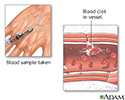Von Willebrand disease
Bleeding disorder - von Willebrand
Von Willebrand disease is the most common hereditary bleeding disorder.
Causes
Von Willebrand disease is caused by a deficiency or poor functioning of von Willebrand factor. Von Willebrand factor helps blood platelets clump together and stick to the blood vessel wall, which is necessary for normal blood clotting. There are several types of von Willebrand disease.
A family history of a bleeding disorder is the primary risk factor.
Symptoms
Symptoms may include:
- Abnormal menstrual bleeding
- Bleeding of the gums
- Bruising
- Nosebleeds
- Skin rash
Note: Most women with heavy or prolonged menstrual bleeding do not have von Willebrand disease.
Exams and Tests
Von Willebrand disease may be hard to diagnose. Low von Willebrand factor levels and bleeding do not always mean you have von Willebrand disease.
Tests that may be done to diagnose this disease include:
- Bleeding time
- Blood typing
- Factor VIII level
- Platelet function analysis
- Platelet count
- Ristocetin cofactor test
- Von Willebrand factor specific tests
Treatment
Treatment may include DDAVP (desamino-8-arginine vasopressin). It is a medicine to raise von Willebrand factor level and reduce the chances for bleeding.
However, DDAVP does not work for all types of von Willebrand disease. Tests should be done to determine what type of von Willebrand you have. If you are going to have surgery, your doctor may give you DDAVP before surgery to see if your von Willebrand factor levels increase.
The drug Alphanate (antihemophilic factor) is approved to decrease bleeding in people with the disease who must have surgery or any other invasive procedure.
Blood plasma or certain factor VIII preparations may also be used to decrease bleeding.
Outlook (Prognosis)
Bleeding may decrease during pregnancy. Women who have this condition usually do not have excessive bleeding during childbirth.
This disease is passed down through families. Genetic counseling may help prospective parents understand the risk for their children.
Possible Complications
Bleeding may occur after surgery or when you have a tooth pulled.
Aspirin and other nonsteroidal anti-inflammatory drugs (NSAIDs) can make this condition worse. Do not take these medicines without first talking to your health care provider.
When to Contact a Medical Professional
Contact your provider if bleeding occurs without reason.
If you have von Willebrand disease and are scheduled for surgery or are in an accident, be sure you or your family tell the providers about your condition.
References
Flood VH, Scott JP. Von Willebrand disease. In: Kliegman RM, St. Geme JW, Blum NJ, Shah SS, Tasker RC, Wilson KM, eds. Nelson Textbook of Pediatrics. 21st ed. Philadelphia, PA: Elsevier; 2020:chap 504.
James P, Rydz N. Structure, biology, and genetics of von Willebrand factor. In: Hoffman R, Benz EJ, Silberstein LE, et al, eds. Hematology: Basic Principles and Practice. 7th ed. Philadelphia, PA: Elsevier; 2018:chap 138.
Neff AT. Von Willebrand disease and hemorrhagic abnormalities of platelet and vascular function. In: Goldman L, Schafer AI, eds. Goldman-Cecil Medicine. 26th ed. Philadelphia, PA: Elsevier; 2020:chap 164.
Samuels P. Hematologic complications of pregnancy. In: Landon MB, Galan HL, Jauniaux ERM et al, eds. Gabbe's Obstetrics: Normal and Problem Pregnancies. 8th ed. Philadelphia, PA: Elsevier; 2021:chap 49.
Review Date: 1/25/2022
Reviewed By: Todd Gersten, MD, Hematology/Oncology, Florida Cancer Specialists & Research Institute, Wellington, FL. Review provided by VeriMed Healthcare Network. Also reviewed by David Zieve, MD, MHA, Medical Director, Brenda Conaway, Editorial Director, and the A.D.A.M. Editorial team.






